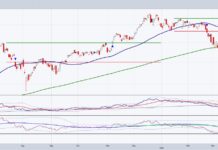- It may mask extremely weak underlying spending. This hypothesis is exactly why I believe autos and housing have surged while the Walmart / Dollar Tree economy seems to sputter. Those with capital are using their wealth to fund purchases while consumers relying on income struggle. The key difference from the Wealth Effect is that I believe capital-heavy consumers may have started to buy because the markets have most recently not produced a return. (Sidebar regarding recent real estate strength – this effect may help to explain the hotness in real estate in spite of millennials reluctance to buy houses and the weakness in new buyers. It’s simply because they do not have capital, likely due to other factors such as student loan debt).
- The ‘Stealth Effect’ could lead to unstable financial markets but more likely could result in upheaval for asset management companies. What does it mean for Vanguard or Fidelity that we’re already seeing 401k’s experiencing withdrawals exceeding contributions? Quickly compare that to 1998’s logic that markets could not decline based on 401k contributions. Finance companies that rely on stable asset levels and inflows will obviously be affected as priorities change.
- Is this the ultimate burning the furniture to heat the home? Could this be one of the last hurrahs of American consumerism? Will we be harvesting years of spending by depleting assets that turn unproductive? Obviously the answers are unknowable, but if this trend occurs, future growth beyond ‘Stealth Effect’ spending could be impaired by balance sheet decisions.
Note also that this is not a ‘Luxury Effect’ which we’ve already experienced this past decade. Perhaps this is why we’re seeing struggles for companies like Macy’s and Michael Kors whereas the last time housing and auto sales were this hot, $600 handbags were more in vogue. In my opinion, that effect where consumers purchased hi-end goods in an effort to feel better about themselves after the’ 08-‘09 meltdown has likely run its course.
Investing analysts and commentators have continued to beat the drum of ‘there is nowhere else to go and equities are the only game in town” as a rationalization for potential stock gains. That assumption contains massive flaws, the largest assuming that the investor remains invested. What if the equities market produces an extended environment of choppiness, stagnancy or heaven forbid, negative returns? Do we know how that works in a 0% world? What keeps an ultra-wealthy investor from pulling $115,000 out of their account to buy that Mercedes SUV they’ve been eyeing? Note to the financial planning police: this is not a recommendation, merely an observation.
This ‘Stealth Effect’ could have wide reaching ramifications if it reaches the importance and significance the ‘wealth effect’ held. We’ve been conditioned to believe consumer spending would decline alongside a frustrating market and we are told to use history as our guide. Times with no textbook available can be periods of great opportunity – if this trend takes hold, I believe it bears watching.
Heart Capital does not offer investment advice via this medium. Under no circumstance whatsoever do these postings, opinions, charts, or any other information represent a recommendation or personalized investment, tax, or financial planning advice.
Twitter: @HeartCapital
No position in any of the mentioned securities at the time of publication. Any opinions expressed herein are solely those of the author and do not in any way represent the view or opinions of any other person or entity.








